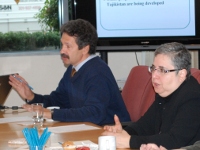IMGXYZ1455IMGZYXDifficulties in managing the shared Aral Sea water basin have created water and energy shortages throughout Central Asia. These cripple the most fragile economies in the region (Kyrgyzstan and Tajikistan) and hamper education, as most schools lack electricity during daylight hours for six to seven months of the school year. In an effort to alleviate this problem in a way that furthers cross-border cooperation, the Carnegie Endowment for International Peace, working with Central Asia’s Eco-Energy Alliance, launched the Central Asia Renewable Energy and Remote Education Project in 2008. Dr. Vitaly V. Khinenzon, Chief Engineer for the project, joined Carnegie’s Martha Brill Olcott to offer an update on its progress.
Current Status:
Khinenzon explained that the project is providing communities with renewable energy systems and training materials to enhance awareness of how these resources can alleviate local energy shortages during the 5-10 year period in which their governments hope to better supply national grids. It is doing this in a way designed to enhance regional cooperation. The project’s main objectives are to provide uninterrupted access to electricity and the internet and to outfit a computer classroom that can serve after school hours as an adult education and a community communications center.
In Spring 2009, a pilot school was opened in the Jami Region of the Khatlon Province in Tajikistan that serves 400 gifted students as well as local orphans. The school uses solar modules to provide electricity, a satellite system to offer Internet access, several laptops, a scanner, a printer, and will soon be equipped with solar driven clean water system purchased in Uzbekistan.
Two other educational institutions (the Kurgan-Tyube branch of Tajikistan’s Politechnical Institute and the Faizabad Lyceum) have been equipped with solar panels and will soon join the network. In addition to the equipment, the schools were also provided with computer-training materials in the Tajik language. Other remedial education materials, as well as training materials on the use of renewable energy, are currently being developed. All materials will be available on a regional portal in Tajik, Russian, and English.
Future Plans:
This project was conceived of by renewable energy experts from Kazakhstan, Kyrgyzstan, Uzbekistan and Tajikistan. These experts are founders of the Eco-Energy Alliance. Pilot schools have been selected in each of these countries to expand the project as funding permits. As these schools come online, they will link through the portal, which will provide materials in each of these national languages. The project is also working with faculty at local universities to modify adult education materials so that these centers can be expanded to include a distance learning based technical training component.
Benefits:
Khinenzon explained the broad social benefits of the project.
- The project is providing remote villages with access to the global community, as the classrooms remain open at night to serve as an Internet-Cafe, as well as eventually as an adult training center. Email and especially voice over internet will provide an inexpensive way for labor migrants to keep in touch with those left behind. Sale of time on the Internet, both in the café and by serving as a local Internet provider for other businesses and homes, will enable the project to be economically sustainable.
- The project is providing user-friendly teaching materials on the use of renewable energy, including how to design systems for domestic use.
- The communities will be shown how to inexpensively provide clean water for domestic use using renewable energy.
- As the project expands, it hopes to ameliorate ethnic tensions by serving schools in border areas. By doing so, the project fosters regional cooperation serving as a regional confidence builder.
